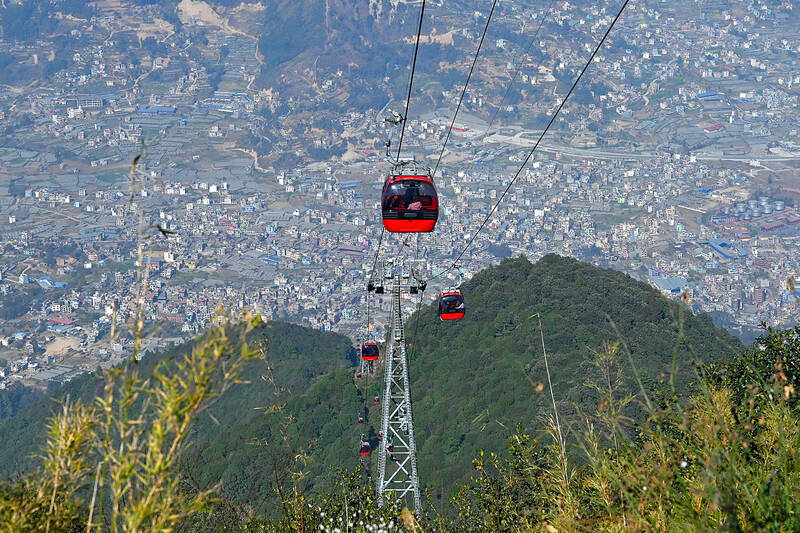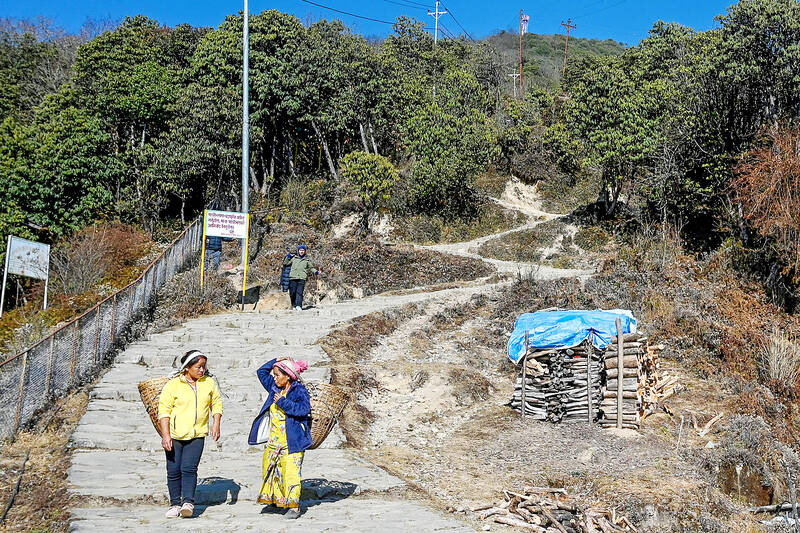They appear tranquil soaring above Himalayan forests, but a string of cable car projects in Nepal have sparked violent protests, with locals saying environmental protection should trump tourism development.
In Nepal’s eastern district of Taplejung, the community has been torn apart by a US$22 million government-backed project many say would destroy livelihoods and damage ancient forests they hold as sacred.
Across Nepal, five cable car projects have opened in the past two years — and 10 more are under development, according to government data.

Photo: AFP
Critics accuse the government of failing to assess the environmental impact properly.
Protests in Taplejung last month escalated into battles with armed police, with four activists wounded by gunfire and 21 police officers injured.
The protests calmed after promises construction would be suspended, but erupted again this week, with 14 people wounded on Thursday — 11 of them members of the security forces.

Photo: AFP
“We were in a peaceful protest, but hired thugs showed us kukris [large knives] and attacked us — and we countered them,” protest committee leader Shree Linkhim Limbu said after the latest clashes.
He vowed to continue demonstrations until the project is scrapped.
About 300,000 Hindu devotees trek for hours to Taplejung’s mountaintop Pathibhara temple every year — a site also deeply sacred to the local Limbu people’s separate beliefs.
Chandra Prasad Dhakal, a businessman with powerful political ties who is also president of Nepal’s Chamber of Commerce and Industry, in 2018 announced the construction of a 2.5km cable car to the temple.
The government calls it a project of “national pride.”
Dhakal’s IME Group is also building other cable cars, including the 6.4km Sikles line in the Annapurna Conservation Area, which the Nepalese Supreme Court upheld.
The government deemed the project a “national priority,” thereby exempting it from strict planning restrictions in protected areas.
The Supreme Court scrapped that controversial exemption last month, a move celebrated by environmentalists, but activists fear the project could still go ahead.
Taplejung is deeply sacred to local Mukkumlung beliefs, and residents say that the clearance of about 3,000 rhododendron trees — with 10,000 more on the chopping block — to build pylons is an attack on their religion.
“It is a brutal act,” Limbu said. “How can this be a national pride project when the state is only serving business interests?”
Saroj Kangliba Yakthung, 26, said locals would rather efforts and funding were directed to “preserve the religious, cultural and ecological importance” of the forests.
The wider forests are home to endangered species, including the red panda, black bear and snow leopard.
“We worship trees, stone and all living beings, but they are butchering our faith,” said Anil Subba, director of the Kathmandu-based play Mukkumlung, which was staged for a month as part of the protest.
The hundreds of porters and dozens of tea stall workers that support trekking pilgrims fear for their livelihoods.
“If they fly over us in a cable car, how will we survive?” 38-year-old porter Chandra Tamang asked.
The government says the cable car would encourage more pilgrims by making it easy to visit, boosting the wider economy in a nation where unemployment hovers at about 10 percent and GDP per capita is just US$1,377, according to the World Bank.
“This will bring development,” said resident Kamala Devi Thapa, 45, adding that the new cable car route would aid “elderly pilgrims.”
The cable cars symbolize Nepal’s breakneck bid to cash in on tourism, making up more than 6 percent of the nation’s GDP in 2023, according to the World Travel and Tourism Council.
Beyond the Pathibhara project, the government’s environmental policy is in question — in a nation that is 45 percent forest.
More than 255,000 trees have been cut down for infrastructure projects in the past four years, according to the Nepalese Ministry of Forests and Environment.
“Nepal has witnessed massive deforestation in the name of infrastructure,” said Rajesh Rai, professor of forestry at Tribhuvan University. “This will have severe long-term consequences.”
Unperturbed, the cable car builder assures his project would create 1,000 jobs and brushes aside criticism.
“It won’t disturb the ecology or local culture,” Dhakal said. “If people can fly there in helicopters, why not a cable car?”
The argument leaves Kendra Singh Limbu, 79, unmoved.
“We are fighting to save our heritage,” he said.
It has split the community, local journalist Anand Gautam said.
“It has turned fathers and sons against each other,” Gautam said. “Some see it as progress, others as destruction.”

Yemen’s separatist leader has vowed to keep working for an independent state in the country’s south, in his first social media post since he disappeared earlier this month after his group briefly seized swathes of territory. Aidarous al-Zubaidi’s United Arab Emirates (UAE)-backed Southern Transitional Council (STC) forces last month captured two Yemeni provinces in an offensive that was rolled back by Saudi strikes and Riyadh’s allied forces on the ground. Al-Zubaidi then disappeared after he failed to board a flight to Riyadh for talks earlier this month, with Saudi Arabia accusing him of fleeing to Abu Dhabi, while supporters insisted he was

The Chinese Embassy in Manila yesterday said it has filed a diplomatic protest against a Philippine Coast Guard spokesman over a social media post that included cartoonish images of Chinese President Xi Jinping (習近平). Philippine Coast Guard spokesman Jay Tarriela and an embassy official had been trading barbs since last week over issues concerning the disputed South China Sea. The crucial waterway, which Beijing claims historic rights to despite an international ruling that its assertion has no legal basis, has been the site of repeated clashes between Chinese and Philippine vessels. Tarriela’s Facebook post on Wednesday included a photo of him giving a

‘MOBILIZED’: While protesters countered ICE agents, Minnesota Governor Tim Walz activated the state’s National Guard to ‘support the rights of Minnesotans’ to assemble Hundreds of counterprotesters drowned out a far-right activist’s attempt to hold a small rally in support of US President Donald Trump’s latest immigration crackdown in Minneapolis, Minnesota, on Saturday, as the governor’s office announced that National Guard troops were mobilized and ready to assist law enforcement, although not yet deployed to city streets. There have been protests every day since the US Department of Homeland Security (DHS) ramped up immigration enforcement in the Twin Cities of Minneapolis and Saint Paul by bringing in more than 2,000 federal officers. Conservative influencer Jake Lang organized an anti-Islam, anti-Somali and pro-US Immigration and Customs Enforcement

NASA on Saturday rolled out its towering Space Launch System (SLS) rocket and Orion spacecraft as it began preparations for its first crewed mission to the Moon in more than 50 years. The maneuver, which takes up to 12 hours, would allow the US space agency to begin a string of tests for the Artemis 2 mission, which could blast off as early as Feb. 6. The immense orange and white SLS rocket, and the Orion vessel were slowly wheeled out of the Vehicle Assembly Building at the Kennedy Space Center in Florida, and painstakingly moved 6.5km to Launch Pad 39B. If the